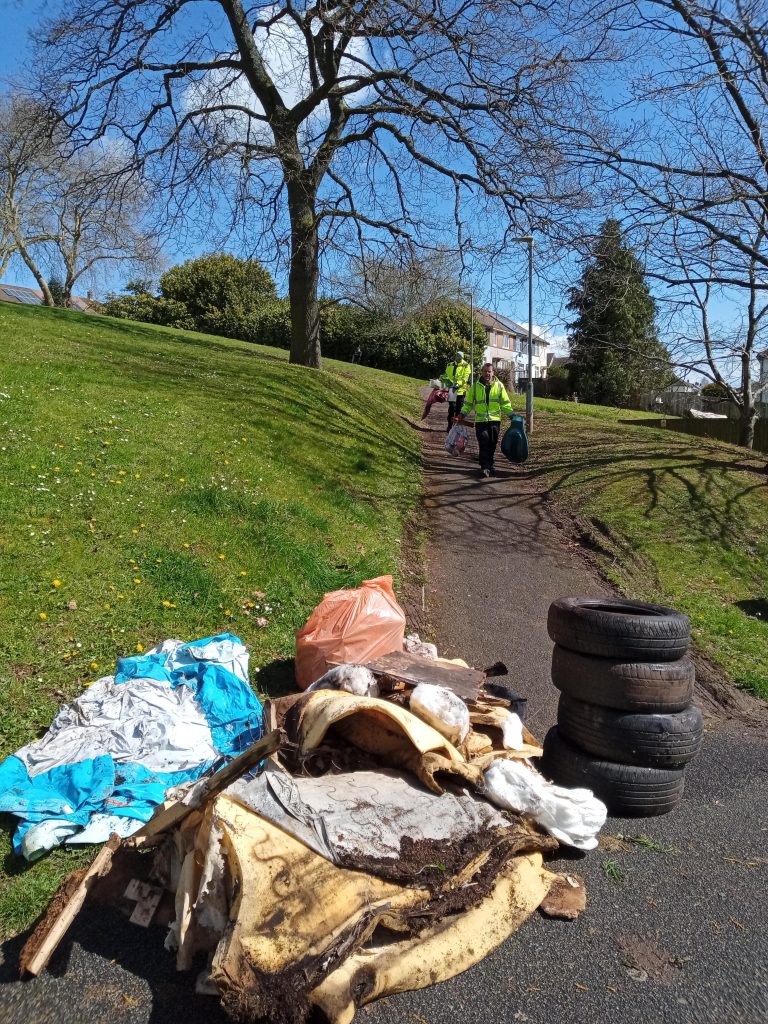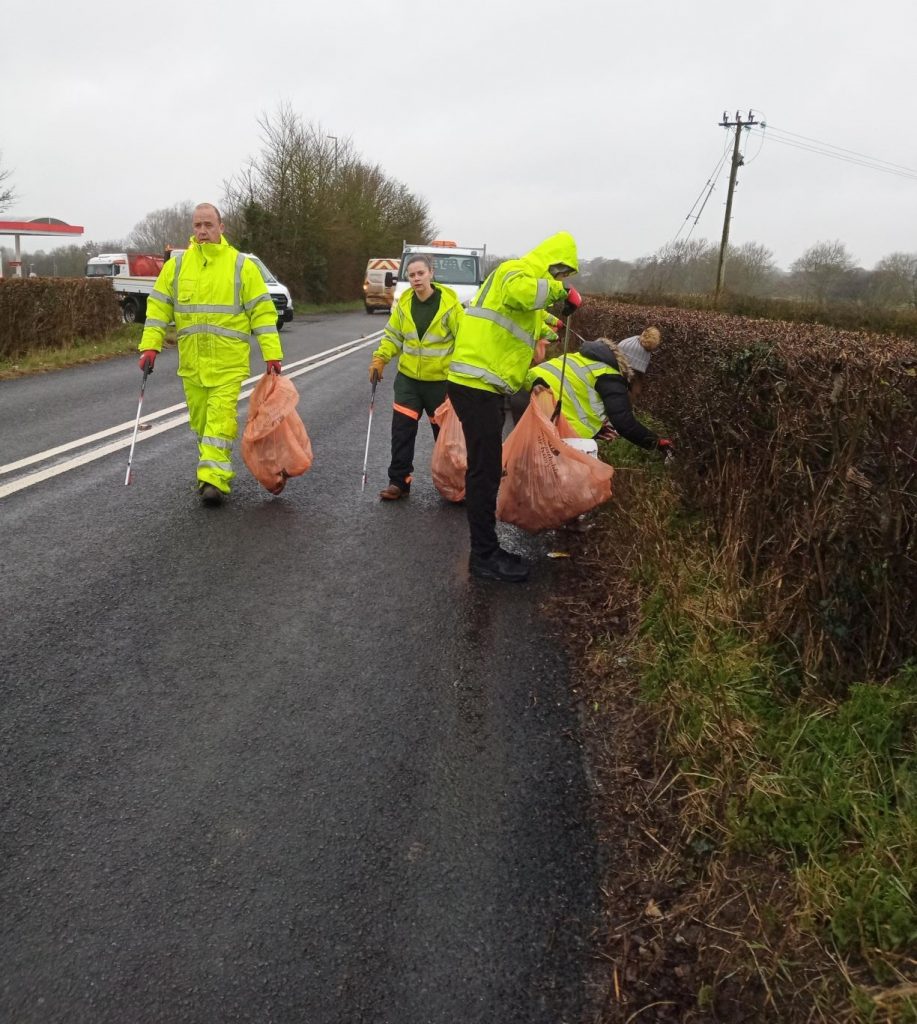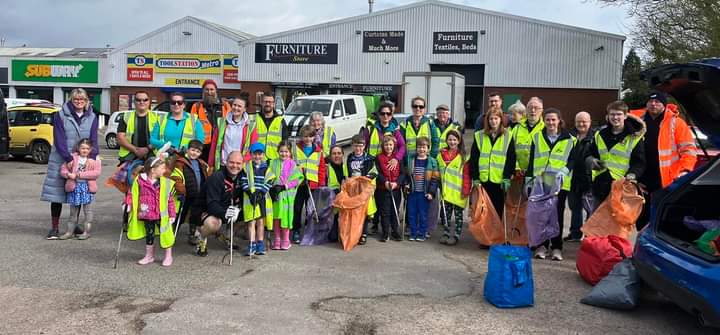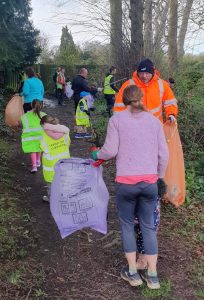

Street Cleaning and Sweeping ▼
The grounds and cleansing department is responsible for many street cleaning tasks such as sweeping, litter picking, graffiti, and vegetation management with the exception of moss which is managed by the county highways department.
Our cleansing teams work out of our three depots located in Llanfoist, Mitchel Troy and Caldicot. Generally, the teams operate across Monmouthshire’s urban areas with additional support from specific town teams in some of our largest settlements.
Town teams are a partnership between the participating town councils and the county council. Town teams provide targeted response to local issues and undertake works to improve the quality of the local environment.
Street sweeping
Small mechanical street sweepers attend to our town centres and urban roads on a scheduled basis. Main roads and major routes are swept with large mechanical sweepers by the county highways department.
Litter picking
Litter picking is done as needed, please see our litter and litter bins page for more information.
Graffiti
Our teams remove graffiti from public infrastructure when found or reported. We do not remove graffiti from private property.
Needles and syringes.
Items such as needles and syringes are classed as “sharps” which is a form of hazardous waste. If you find any such waste, do not attempt to clear it up. Immediately contact us and we will send trained staff out with appropriate equipment to clear and dispose of it safely. See the link below for further information and a contact form:
Litter and litter bins ▼
Litter is an issue that we all need to combat together. Litter picking is done regularly where required by our staff. Additional support is provided by volunteers though everyone can get involved by simply taking home their litter if there are no litter bins close by or the bin is full. All bins are emptied regularly, though some more frequently depending on use.
You can report litter or a litter bin issue by using the by using the Monmouthshire webpage or MyMon app which by registering your details will allow you to track the progress of your report and receive updates as it is processed.
If you would like to volunteer to pick litter, see our volunteering page.
Litter bins
There are around 850 litter bins around the county and a further 350 dog waste bins. Most litter bins are owned and managed by the county council and some by town and community council. Litter bins are normally emptied on either a winter or summer scheduled. In addition, we will carry out adhoc servicing where demand requires.
We work with town and community councils, litter groups and champions , councillors and others to deal with litter bin issues and in change bin locations as our communities change.
All dog waste bins are the responsibility of town and community council and are serviced by an external contractor. For more information about dog bins and dog fouling, please see the relevant web page here
Litter recycling
As with your household waste, it is important to recycle all waste where possible. Monmouthshire County Council has some public recycling bins and we are hoping to install more. Where recycling bins are available, please follow the instructions on the bins where you see them or take recyclable items home (cans, bottles and clean paper).
Sky Lantern Release
Whilst sky lanterns and balloons have gained popularity, eventually they come back down to the ground and can cause harm. Sky Lanterns and mass balloon releases are now considered a form of littering and in Monmouthshire, releasing sky lanterns and balloons is prohibited on all Council owned/controlled land and green space. We encourage our residents not to release these items for the benefit of the environment and future generations.
Legislation and prosecution regarding litter
Litter includes but is not limited to: packaging, food, cigarette ends, refuse bags. It’s an offence to throw or drop litter in any place to which the public have access; this includes littering from vehicles (section 87 Environmental Protection Act 1990).
Littering is damaging to the environment, and anyone caught may face a fine of up to £2,500. Litter can be washed into waterways and eventually out to sea where it is virtually impossible to remove. The RSPCA deals with an average of 14 calls a day about wildlife that has become trapped or injured by discarded waste. The cost of dealing with litter across the UK is in the region of £850million a year.
By helping to reduce litter, you will help reduce cost in time and money to the council that can be used to support other services. You will also be helping to make Monmouthshire an even better more attractive county that is a haven for wildlife.
Sharps and hazardous waste
Items such as needles and syringes are classed as “sharps” which is a form of hazardous waste. Do not attempt to clear any litter of this type. Immediately contact Monmouthshire County Council. See the link below for further information and a contact form:
Dog Fouling ▼
Please make sure you dispose of your dogs’ waste properly and carry a dog faeces bag when you walk your dog. You can then put it in designated dog waste bin, any public litter bins (excluding play areas and recycling bins) or take it home and put it in your black bag for the household refuse collection. Dog waste bins should NOT be used to dispose of quantities of dog waste collected from your garden, please dispose of this in your household waste. Dog waste bins are costly to provide and service, do NOT use them for ordinary litter; take your litter home with you or use a litter bin.
Your county, town and community councils spend a lot of money, time and effort dealing with the issue of dog fouling. It is an offence to allow your dog to foul in a public area and not clean up after it. Although most dog owners are responsible, there is still a minority who do not clean up after their pets. In Monmouthshire, dog waste bins are owned by town and community councils. If you see an issue with a dog waste bin contact them directly.
You can report a dog fouling issue anywhere in Monmouthshire by using the Monmouthshire webpage or MyMon app. Registering your details will allow you to track the progress of your report and receive updates as it is processed.
Dog fouling is an issue for most of our towns and villages. It is the most offensive type of litter and is consistently raised as a matter for public concern. It can have health risks such as Toxocariasis, an infection caused by roundworm parasites which can be found in dog faeces. Dog fouling can also cause illness in farm and wild animals, so please pick up after your dog regardless of where you live or walk your pet. We receive many complaints about dog fouling on sports pitches, as this is the environment in which people are most likely to come into direct contact with dog fouling. The County Council has ongoing campaigns to prevent fouling in all areas and has specific signs for sports pitches. Please contact us if you feel these would help in your area. If you need more information contact Environmentalhealth@monmouthshire.gov.uk
The Penalty
Where there is evidence a person has failed to pick up their dogs’ faeces, they will be given a fixed penalty notice of £75 to be paid within 14 days (reducing to £50 if paid within 10 days). Failure to pay will result in Monmouthshire County Council prosecuting the offender in the magistrate’s court and could lead to a fine of £1000.
We will take action if council officers, police officers or residents report a dog fouling incident. If you believe you have witnessed an offence of littering or dog fouling please fill in our e-form on My Monmouthshire. We may ask you to provide a witness statement..
Public Spaces Protection Order
Monmouthshire County Council adopted a Public Spaces Protection Order (PSPO) related to controlling dogs in 2024. Find out all you need to know about the PSPO here: https://www.monmouthshire.gov.uk/public-spaces-protection-order-2024-dog-control/
‘Give dog fouling the red card’ campaign
Most of our Town and Community Councils are a part of the ‘Give Dog Fouling the Red Card’ campaign. These councils work in partnership with the County Council to prevent dog fouling through education, signage and provision of bins and dog waste bags
Fly Tipping ▼
Fly Tipping
Fly-tipping is the illegal deposit of any waste on to land that has no license to accept waste. Fly-tipping can be dangerous, pollute land and waterways and costs the taxpayer significant amounts of money to clear away. If you are caught you will be prosecuted and fined.
Waste might include:
- Garden Waste
- Electrical goods
- Furniture
- Building waste
- Chemicals
- Household or commercial waste
Duty of Care
Remember – if you are asking a third party (e.g. a builder or contractor) to dispose of waste on your behalf, you must ensure they are a registered waste carrier. You are responsible for checking they are registered, so always ask to see their certificate.
Always get a receipt confirming what they have taken, where they will dispose of it and details of any payment made. Make a note of their name, vehicle type and registration and the date they took the waste away.
Details of registered waste carriers can be found on Natural Resources Wales website.
For more information please download the following leaflets:
Fly-tipping on private land is the responsibility of the landowner to clear it.
You can check if the fly-tipping has already been reported on the map below:
Report it
You can report flytipping anonymously, but by registering your details you can track the progress of your report and receive updates as it is processed. Giving us your details can also help as we can contact you for further information if required.
Sustainability ▼
Monmouthshire County Council is committed to sustainability and runs regular campaigns to reduce littering and dog fouling and to raise the profile of the issues. This helps promote healthy sustainable ecosystems, which in turn increases the wellbeing of those living within the communities.
We work closely with partner organisations including Keep Wales Tidy (link) and constantly seeking new approaches to reducing litter. Our most recent campaign is with CaruCymru allowing us to support volunteer litter pickers leading to more sustainable communities. See here for more information on volunteering with Monmouthshire.
Volunteering ▼
Volunteering is an excellent way to support the community and can increase mental and physical wellbeing. Additionally, it is a fantastic way to meet new people. Volunteers are vital members of our community, and there are many ways you can get involved. If you are interested in volunteering within your community to support the grounds and cleansing department, see below to find out how.
Litter picking:
There are many ways to volunteer with litter picking, please look at the keep Wales tidy website for opportunities including how to source equipment from the Keep Wales Tidy hubs and help starting community groups:
We have over 400 individual litter County Council Volunteer Champions who keep areas near their homes litter free. They receive litter pickers, hi viz and bags to enable them to volunteer. Each town has a litter hub where it is possible to borrow litter kit occasionally or regularly: https://keepwalestidy.cymru/caru-cymru/litter-picking-hubs/. Some villages also have litter kit that can be borrowed, eg The Bryn, Llanhennock and Dingestow.
In addition to this, there is a Monmouthshire volunteer portal for volunteering which covers a broad range of volunteering opportunities:
https://volunteer.monmouthshire.gov.uk/index-classic

